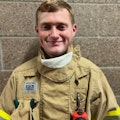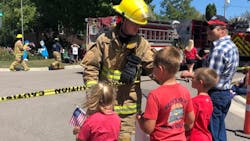Sense of Duty: Prioritizing Your Decisions for the People
Key Highlights
- In Colonial America, putting out a fire that could have been prevented was considered the most inefficienct use of community resources.
- Firefighters must think of 9-1-1 callers as neighbors. This way, community-conscious decisions are made, and one's duty will be clear.
- Many new firefighters see no honor in searching for and rescuing someone in a fire that could have been prevented with a smoke alarm or public fire education. To counter this, the fire service must prioritize public education.
While reading Cyclopedia of Fire Prevention and Insurance, I learned that the roots of America’s fire problem likely is attributed to capitalism. Unsurprisingly, widespread use of cheaper building materials was a necessity at the time. Building structures in the country’s early days needed to be as low-cost-feasible as possible. As compared with much of the European architecture, which is made of brick and stone, Colonial Americans built with wood, which was much more inexpensive and in much greater supply. Unfortunately, as most of us are aware, wood is highly combustible and spreads fire easily. This, surely, imbued an emphasis on fire protection in the country’s early founders.
Economic strains forced citizens, families and businesses to live in/operate out of buildings that were made entirely of combustible materials. Thus, living in combustible structures is almost second nature to many of us today. Imagine the sense of duty at the time of the nation’s first firefighters, who were unable to change how people were able to live. Many local ordinances didn’t ban the use of combustible building material.
Fire prevention
Hundreds of citizens only could watch as businesses and houses burned to the ground, many times with family members trapped inside. Having nothing more than buckets of water and long polling tools at their disposal, fighting a fire was the most inefficient use of community resources.
A natural tenet, at the time, was to prevent fires from occurring in the first place. Many communities utilized volunteer wardens, or watchmen, to roam the streets looking for fire. Insurance companies prompted the use of inspectors to identify potential fire problems. There was no valid duty in putting out a fire that could have been prevented.
Fire protection
Despite the absence of thermal barriers, SCBA, hoselines, tools and ladders, members of the community still were compelled to provide fire protection action at any time of day. These brave people were called firefighters. As communities grew, fire duty increased, and the need for organized firefighting efforts surely became evident. Faster response times from on-duty members could reduce the amount of damage that was incurred significantly. Additionally, simply accepting the help of a neighbor during the time of a fearful and deadly emergency wasn’t sufficient.
This is where the first fiduciary relationship began to exist between the public and its civil servants: average-citizens-turned-heroes, taking upon themselves the duty to help to protect society from fire, an element of earth that many times never can be controlled. Imagine yourself in the shoes of the nation’s first firefighters: Absolute heroism compelled every action. This made the profession sought after, and documents show that there was no difficulty in recruiting members.
Fundamental beliefs of the founding American citizens surely consisted of the responsibility to share fire protection for their neighbor.
Present day
Who reminds us of the dedication, commitment and sense of duty that the forefathers of firefighting had for the public? Is this sense of duty still necessary? The public has come to know firefighters as kind, caring and responsible individuals because of what they do during times of crisis. Regardless of whether an emergency is valid, the citizens always expect that a dutiful firefighter will arrive and provide aid. However, how does a firefighter embody a sense of duty when a building has suffered a consequential loss?
Sometimes, the original duty of firefighters is lost in translation.
Finding a sense of duty, no matter what your position, title or role is in the firehouse, tests on your character. Firefighters who have a sense of duty are very much dependent on their level of courage, care and determination to put the public first. The way that I was able to explore this sense of duty was by empathizing with a family who lost nearly all of their belongings in a multifamily dwelling fire. Not unlike how our ancestors lived hundreds of years ago, we must think of our 9-1-1 callers as neighbors. Our vulnerable neighbors deserve better care and attention.
Latitude
I am fortunate that the ambivalence of the firefighting profession has given us as much latitude as we want to serve the public better. Unfortunately, most members of the community don’t know what an acceptable level of service or care looks like, as long as a shiny red truck shows up to their emergency. Little does the public understand the importance of fire prevention, fire inspection, public education and emergency preparedness.
Firefighters who choose to do anything less than better themselves and their community for an emergency event are akin to ethical corruption. We can’t turn a blind eye toward the best possible outcome, which is no fire at all.
The funds that service our departments are meant to provide the best service possible, yet the majority of firefighters refuse to seek opportunities for how fire protection can be better provided and to integrate risk reduction in their duty.
The good news is that the fire service always has been a positive feedback loop. When good choices are made for the community, they capitalize and compound value over time. Choosing to prepare citizens against the dangers of fires and threats is the most noble and honorable behavior choice that firefighters can make. By making community-conscious decisions, your sense of duty will be clear.
I have found absolute clarity in the purpose of my life. It’s my duty to be a firefighter.
Leaders
Has the intent of the firefighter’s original duty ever changed, or has selfishness infiltrated its vision? Perhaps you’ve heard, “I like going to fires” or “We need a fire to boost morale.” These phrases are dangerous. If police officers suggested that a good murder would make them feel better, the community would be appalled, and trust would be eroded. Firefighters must have the aptitude to practice the freedom that’s given by the public righteously. When righteous decisions are made by firefighters, public trust is built. Firefighters should seek ways to encourage citizens—their neighbors—to make better decisions against fire and threats.
Citizens before self
I take pride in calling myself a firefighter, although the duty of this position isn’t what I originally thought that it was. It’s almost unfathomable to think of a situation in which the ultimate duty of a firefighter has been outweighed by any other reason. If selfishness were used in performing vital fireground tasks, it would be viewed as cowardice and freelancing. That said, many times, we remain too selfish to take a few minutes out of our day to educate the public on how to make themselves safer. Courage, heroism, training, education, physical fitness, camaraderie, fire prevention, fire education and emergency preparedness are all components of our duty.
We live in a combustible country. Most new firefighters who I talk to are deciding to leave the profession, because they have asked themselves whether response to death and destruction is a valuable use of their time. Many new firefighters recognize that the fire service hasn’t changed progressively for more than 100 years, and reaction still remains the focus. Many new firefighters see no honor in searching for and rescuing someone in a fire that could have been prevented with a smoke alarm or public fire education.
To carry on our legacy American firefighting, we must prioritize putting the needs of the citizens before our own. We must prioritize preventing fires from occurring in the first place. When will we recognize this as part of our core duty?
You must secure your sense of duty mentally and combine it with the love of humankind.
About the Author

Collin Hofschulte
Collin Hofschulte is a career firefighter, fire instructor and medical coordinator for the Duluth, MN, Fire Department. He has served in various educational roles since 2020, first as a paramedic preceptor for Mayo Clinic Ambulance then as a Fire Instructor II for fire instruction and rescue education. Hofschulte recently was appointed as a principal for the NFPA Technical Committee on Emergency Service Organization Risk Management. He is an alumnus of the Mayo Clinic School of Health Sciences Paramedic Program. Hofschulte holds an Associate of Arts in Liberal Arts & Sciences from Riverland Community College, a Bachelor of Science in fire administration from Columbia Southern University (CSU) and a Master of Science in fire executive leadership-human resource management from CSU.
